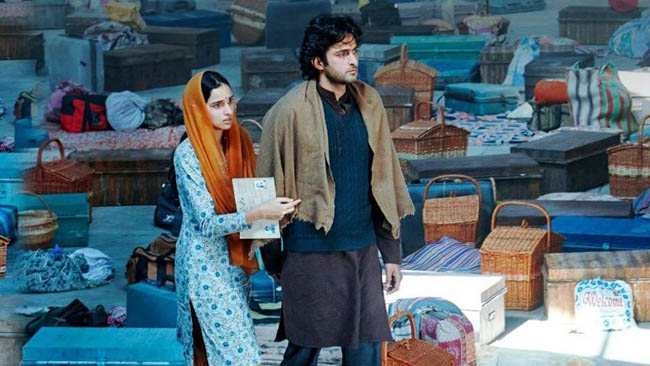
It has been 30 years since the exodus of Kashmiri Pandits when over 4 lakh families were rendered homeless. Filmmaker Vidhu Vinod Chopra’s mother was also among those who could never return to Kashmir. Using his cinematic sensibilities to narrate this tragic tale, Chopra’s latest directorial venture, Shikara is set in the picturesque Kashmir Valley — snow-capped mountains, tall pine trees, scenic views and local flavour is in abundance. The film doesn’t boast of a flashy cast and stars two fresh faces instead — Aadil Khan and Sadia. This, however, turns out to be its strength, as the pair delivers such a convincing performance.
Many might feel the film is Chopra’s safest and most restrained works, more so because it’s the closest to his heart and somewhat defines his being. But, one can’t overlook the heart and soul he has put into this film — a slice-of-life or a tragic leaf straight out of his own family’s past — and with each frame, you sense the pain he wants to show. Even though the filmmaker chooses to call it a ‘work of fiction’, it’s heart-warming to see how he kept things as real as he could by bringing in actual refugees who were displaced when this happened three decades ago.
Shikara is a love story at heart, but in the most endearing and moving way. However, whatever happens in between – the exodus of Kashmiri Pandits — is tragic and a chapter in the history that will pain each time it’s touched upon. The film starts in the present day with its lead pair in their late 50s and then the major portion of it is shown in flashback. Shiv Kumar Dhar (Aadil) and Shanti (Sadia) happen to fall in love at first sight while doing an impromptu cameo act for the film Love in Kashmir being shot in the Valley. Soon, they have a traditional Kashmiri style wedding with musical instruments and local dance alleviating the mood. There are softer moments as the couple sets up their new house and names it Shikara for a reason, Sadia expresses her dream of seeing Taj Mahal one day while Shiv aspires to complete his PhD.
But all this is short lived as insurgency and communal tension disrupt the happy lives of Kashmiri Hindus and Muslims and arbitrary killing starts mostly targeting Pandits, forcing them to abandon their homes. Joining thousands of others, Shiv and Shanti too leave behind their neighbourhood and move to refugee camp in Jammu, and stay there for years.
The scenes at the refugee camps are saddening and heartbreaking, and capture the pain. Especially the scene when a truck full of tomatoes arrives and everyone across age groups rushes to grab a few of them leaves you teary eyed. Or the scene when an old man is continuously pleading and shouting that he wants to go back to Kashmir evokes a sense of empathy. Chopra has beautifully and convincingly shown the helplessness of refugees with Shiv relentlessly writing letters to US Presidents — from Bush to Clinton to Bush to Obama — for 28 years, and even when he knows he won’t get a reply, he doesn’t lose hope.
While the writing and direction definitely are the strong points, it’s the pitch perfect performances that make all the difference. However, I still feel the storytelling could have been much stronger for the topic it is based on. Shikara, in parts, looks rushed and at times when the tension begins to affect you emotionally, the story rushes back to showing the love story of the lead pair.
The background score by A R Rahman and Qutub-E-Kripa adds soul to the film and is ably supported by Irshad Kamil’s lyrics. The songs stay with you for a long time.
Shikara touches your heart while making you smile and cry at the same time. Chopra does justice to his direction though a much hard-hitting narrative is what one continues to wait for.